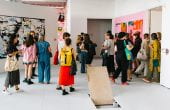
Amid government talk of ‘low value’ university courses, you could be forgiven for thinking our economy doesn’t need the arts and humanities. Degrees including performing arts and media studies face a potential 50% reduction in their government subsidy from next year, as they fail to make the cut on a government list of strategic priorities.
So I was pleased to see a new report from SKOPE Oxford which sets the record straight, shining a light on the vital narrative skills that arts and humanities subjects supply to the business world.
Drawing on interviews with 34 business leaders – mostly CEOs of FTSE 100 companies – the research concludes that narrative and narrative skills are “fundamental and indispensable” to 21st century business, with arts and humanities graduates singled out as specialists in this skillset.
From the written word to facial expression, body language and staging – respondents highlighted the role of performance and storytelling in business, whether in conveying a message to clients or driving engagement within an organisation. Crucially, these narrative skills are needed across an organisation and not just among CEOs and senior leaders – and they are far from the ‘soft skills’ they might have been labelled as in the past.
Narrative skills are “fundamental and indispensable” to 21st century business
The link to arts and humanities education is clear: students of these subjects spend their degrees dealing in narrative. They are debating ideas, thinking critically and creatively and considering alternative perspectives throughout their courses. I see these skills showcased by so many of our students here at Goldsmiths – from the work of our creative writing students, to our performance degree shows, where students of Design, Theatre, Music and a host of other creative disciplines display their final projects.
I was particularly interested to see a new narrative skills framework proposed in the report. This sets out a list of core skills needed by businesses in the future, to guide education and training providers in their support for students.
SKOPE’s research makes an important point on the need for collaboration between the education and business worlds. It’s clear we need strong links between the two to support graduates in making the transition from study to the workplace. At Goldsmiths, we’ve built links with a range of corporate partners, including a long-standing partnership with Santander, who have supported hundreds of our students to take on paid internship placements and pursue entrepreneurial projects.
As businesses look to life beyond the pandemic, getting recruitment right couldn’t be more important. But with the challenges faced by arts and humanities education, there is a real risk of disruption to this key talent pipeline.
I hope this research is another reminder of just how much arts and humanities graduates have to offer – to individuals and to our wider economy.




